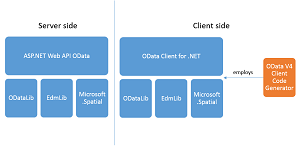News
Microsoft Intros Next-Gen OData
The Microsoft-initiated OData protocol introduced way back in 2007 is in need of an update, the company said in announcing the next-gen version: OData NxT.
OData, short for Open Data Protocol, became an OASIS standard that "enables the creation and consumption of REST APIs, which allow Web clients to publish and edit resources, identified using URLs and defined in a data model, using simple HTTP messages."
The OData.org site says "OData helps you focus on your business logic while building RESTful APIs without having to worry about the various approaches to define request and response headers, status codes, HTTP methods, URL conventions, media types, payload formats, query options, etc. OData also provides guidance for tracking changes, defining functions/actions for reusable procedures, and sending asynchronous/batch requests."
 [Click on image for larger view.] OData (source: Microsoft).
[Click on image for larger view.] OData (source: Microsoft).
The idea to update OData to "withstand the forever changing requirements in software design and architecture" has actually been in the works for a while now, as Microsoft engineer Sam Xu said "it's time to move OData to .NET 5" back in April 2020 in a blog post explaining exactly how to do that.
 [Click on image for larger view.] OData Visual Studio Extension (source: Microsoft).
[Click on image for larger view.] OData Visual Studio Extension (source: Microsoft).
While Xu's post simply explained how to move an existing ASP.NET Core project to .NET 5, Xu was more recently enlisted to help update OData itself, explained Microsoft's Hassan Habib, senior software engineering manager, in a Jan. 4 blog post.
"Few months ago I announced a collaboration with the OData team to start building a new version of OData that can withstand the forever changing requirements in software design and architecture," Habib said. "I got together with Sam Xu and we decided to kick-off a spin-off version of OData.NET that I called OData NxT."
Habib said the project attempts to reconceptualize the core capabilities of OData while at the same time maintaining the original syntax protocols originally published by Microsoft.
He listed these three new fundamental design capabilities to OData.NET:
- Protocol Agnosticism: The new implementation is aiming towards creating a communication protocol-agnostic library. Which means that OData may no longer be tied up to RESTful APIs communication and can be used broadly across any system-to-system integration.
- Modularity: Modular technology allows the community of engineering to develop and contribute to any platform to make it more useful to fit particular scenarios that may be beyond the priorities of the core engineering team.
- Transcendence: Modern software architecture demands certain capabilities in terms of integration. We want to allow OData queries to pass through any number of microservices/lambdas to land on the data-owner service and successfully execute and retrieve a query.
An initial project roadmap shows what's in store:
 [Click on image for larger view.] OData NxT Roadmap (source: Microsoft).
[Click on image for larger view.] OData NxT Roadmap (source: Microsoft).
Meanwhile, he said it's important to note the following about the project:
- OData NxT does not replace the existing efforts on the current implementation of OData, The OData team will continue to provide more features and new releases of OData while the NxT project effort is going in parallel.
- This is the official repository of OData.NxT -- you will find there all documentation, references, blog posts, recordings and most importantly discussions.
- OData NxT is a community effort, we encourage all software design fans out there to join us in shaping the future of OData together. This is a great opportunity to witness the birth of a new technology, step by step and from scratch. My promise is to document every step of the way so you can learn as much as possible from our patterns but also from our mistakes.
- I use initiatives like these to bring the engineering community closer together to build something great. This will happen through pairing sessions like the ones you see here and through discussions as well.
- This effort will be mainly driven by myself and Sam Xu -- please reach out if you have any questions or topics of discussion.
- We appreciate the community excitement for this new initiative, and we hope we can deliver something amazing by the end of this year.
"I'm going to document every single step of the way with blogs, videos and pull requests to help newcomers and contributors understand where we were, and where we are today and where we are headed with this technology," he said.
About the Author
David Ramel is an editor and writer at Converge 360.